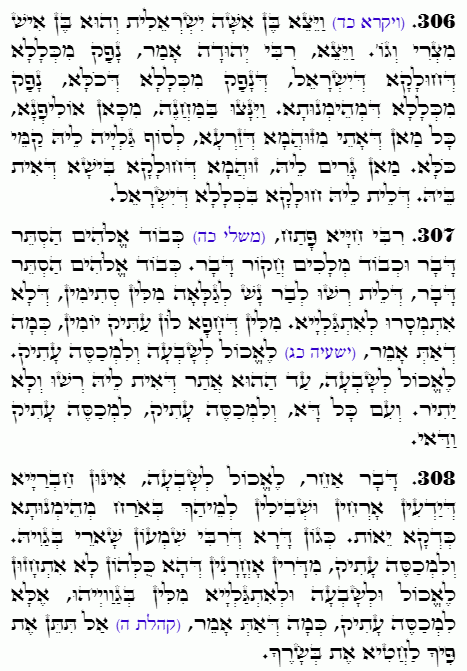Daily Zohar # 4574 – Emor – Eat to satiety, but do not let your mouth cause your flesh to sin
Daily Zohar 4574

Hebrew translation:
307. רַבִּי חִיָּיא פָּתַח, (משלי כה) כְּבֹד אֱלֹהִים הַסְתֵּר דָּבָר וּכְבֹד מְלָכִים חֲקֹר דָּבָר. כְּבֹד אֱלֹהִים הַסְתֵּר דָּבָר, שֶׁאֵין רְשׁוּת לְאִישׁ לְגַלּוֹת דְּבָרִים סְתוּמִים שֶׁלֹּא נִמְסְרוּ לְגִלּוּי, דְּבָרִים שֶׁכִּסָּה אוֹתָם אוֹתָם עַתִּיק הַיָּמִים, כְּמוֹ שֶׁנֶּאֱמַר (ישעיה כג) לֶאֱכֹל לְשָׂבְעָה וְלִמְכַסֶּה עָתִיק. לֶאֱכֹל לְשָׂבְעָה, עַד אוֹתוֹ מָקוֹם שֶׁיֵּשׁ לוֹ רְשׁוּת וְלֹא יוֹתֵר. וְעִם כָּל זֶה, וְלִמְכַסֶּה עָתִיק, לִמְכַסֶּה עָתִיק וַדַּאי.
308. דָּבָר אַחֵר לֶאֱכֹל לְשָׂבְעָה – אוֹתָם הַחֲבֵרִים שֶׁיּוֹדְעִים דְּרָכִים וּשְׁבִילִים לָלֶכֶת בְּדֶרֶךְ הָאֱמוּנָה כָּרָאוּי, כְּמוֹ הַדּוֹר שֶׁרַבִּי שִׁמְעוֹן שָׁרוּי בְּתוֹכוֹ. וְלִמְכַסֶּה עָתִיק – מִדּוֹרוֹת אֲחֵרִים, שֶׁהֲרֵי כֻּלָּם לֹא רְאוּיִים לֶאֱכֹל וּלְשָׂבְעָה וְשֶׁיִּתְגַּלּוּ דְבָרִים בְּתוֹכָם, אֶלָּא לִמְכַסֶּה עָתִיק, כְּמוֹ שֶׁנֶּאֱמַר (קהלת ה) אַל תִּתֵּן אֶת פִּיךָ לַחֲטִיא אֶת בְּשָׂרֶךָ.
.
Zohar Emor
Continued from previous DZ
#306
Leviticus 24:10
“וַיֵּצֵא בֶּן אִשָּׁה יִשְׂרְאֵלִית וְהוּא בֶּן אִישׁ מִצְרִי בְּתוֹךְ בְּנֵי יִשְׂרָאֵל וַיִּנָּצוּ בַּמַּחֲנֶה בֶּן הַיִּשְׂרְאֵלִית וְאִישׁ הַיִּשְׂרְאֵלִי.”
“Now the son of an Israelite woman, whose father was an Egyptian, went out among the children of Israel, and this Israelite woman’s son and a man of Israel fought each other in the camp.”
Rabbi Yehuda said the statement “ויצא,” “Went out” means “he departed from the portion of Israel, he departed from everything, he left the fold of faith. From “וַיִּנָּצוּ בַּמַּחֲנֶה” “And they quarreled in the camp,” we learn that anyone who comes from an impure seed will eventually reveal this to everyone. What causes this? The impurity of the evil part within him because impurity has no share in the people of Israel.
#307
Rabbi Chiya opened,
Proverbs 25:2
“כְּבֹד אֱלֹהִים הַסְתֵּר דָּבָר וּכְבֹד מְלָכִים חֲקֹר דָּבָר.”
“It is the glory of God to conceal a matter, But the glory of kings is to search out a matter.”
“The honor of God to conceal” implies that one is not permitted to reveal hidden secrets that were not meant to be disclosed, secrets that the “Atik Yomin” has covered. This refers to the first three Sefirot.
“לֶאֱכֹל לְשָׂבְעָה וְלִמְכַסֶּה עָתִיק” “To eat to satiety, as it were, and to cover the Ancient One” (Isaiah 23:18). To eat to satiety means to reveal up to the point where one is permitted, which refers to the lower Sefirot (Six Sefirot of Zeir Anpin), and no further. Similarly, “and to cover the Ancient One” certainly means not to reveal what one is not related to, which pertains to the upper three Sefirot.
#308
“Another interpretation of ‘to eat’: ‘To eat to satiety’ refers to the friends who know the paths and ways to walk on them in the way of faith (אֱמוּנָה) appropriately. Such as the generation in which Rabbi Shimon presided. And ‘to cover the Ancient One’ pertains to other generations, which are not worthy to ‘eat to satiety,’ meaning that the secrets should not be fully revealed among them, but rather, they should ‘cover the Ancient One.’ Hence,
Ecclesiastes 5:5
“אַל תִּתֵּן אֶת פִּיךָ לַחֲטִיא אֶת בְּשָׂרֶךָ וְאַל תֹּאמַר לִפְנֵי הַמַּלְאָךְ כִּי שְׁגָגָה הִיא לָמָּה יִקְצֹף הָאֱלֹהִים עַל קוֹלֶךָ וְחִבֵּל אֶת מַעֲשֵׂה יָדֶיךָ.”
“Do not let your mouth cause your flesh to sin, nor say before the messenger of God that it was an error. Why should God be angry at your excuse and destroy the work of your hands?”
Lesson;
Rabbi Yehuda interprets the phrase “ויצא” (and he went out) as leaving the spiritual boundaries set by the Torah laws. The subsequent conflict (“וינצו במחנה,” and they quarreled in the camp) is seen as a manifestation of underlying spiritual impurity.
The proverb from Proverbs 25:2 is interpreted to illustrate the sacredness of supernal secrets, emphasizing that some aspects of divine knowledge are intended to remain concealed, safeguarded within the realm of the unknowable, represented by the upper Sefirot (Keter, Chokhmah, Binah). This spiritual guideline stresses the importance of the boundaries of revelation, highlighting that while seekers of wisdom might delve into mysteries that are beyond human grasp and should remain hidden to preserve the sanctity and honor of God. The main issue with revealing high secrets is that most people on a lower level of spiritual understanding would interpret spiritual symbols as something of physical existence. This would go against the second commandment.
“To eat to satiety” is a metaphor for fully engaging with and understanding the teachings of Kabbalah, which are accessible only to those who are spiritually equipped to navigate such profound realms, like Rabbi Shimon bar Yochai’s disciples.
“Do not let your mouth lead your flesh to sin,” warning against the irresponsible or inappropriate disclosure of sacred knowledge that could lead to negative consequences, emphasizing the responsibility of possessing deeper spiritual insights.
It is good to share the Zohar studies, but at the same time, we don’t want to share with people that do not respect the wisdom of the Zohar or interpret it wrongly.
{||}

 Previous: Emor
Previous: Emor
